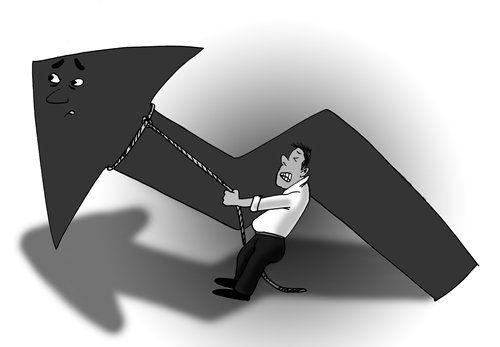
Illustration: Luo Xuan/Global Times
The investment enthusiasm from China for Ethiopia seems to be weakening. According to British media, most local business people, diplomats and bankers have stated that a "more cautious attitude" is being adopted by Chinese entities toward Ethiopia.
The inefficiency of some flagship Chinese-funded projects, such as the operation of freight rail services between Addis Ababa and Djibouti, is thought to be behind such investment reluctance.
The change in China's investment and financing attitude toward Ethiopia is worthy of concern. It reflects a sort of broader "exhaustion" of China's foreign investment after years of high growth.
Chinese companies, both private and State-owned financial institutions, are rethinking their strategies and the associated risks of overseas investment.
This trend has also affected China's investment in Africa, which has shown signs of a decline. As falling commodity prices have weighed on the African economy, private entrepreneurs have begun to withdraw. Meanwhile, with the rising wages of labor force in China, the willingness of low-skilled Chinese laborers to work in Africa has decreased.
Why has China's foreign investment (including that headed to Africa) begun to decline? What impact will this trend have on China's Belt and Road (B&R) initiative? A host of factors may be leading to the decline.
First, policy might be a reason. Due to fears of capital flight and financial risks, China has significantly tightened supervision of private enterprises' foreign investment since 2017. Policy factors strongly slowed flows of foreign investment in 2017.
Second, foreign investment has been restricted because of the decline in China's foreign exchange reserves. From the end of 2014 to 2016, under the dual impact of yuan depreciation and capital outflows, reserves fell by a significant $1 trillion, which put regulators in China on alert against further declines.
Third, China's investment in developed countries began to be reviewed more strictly by regulators in those economies.
Fourth, with the increase in China's foreign investment, associated risks began to emerge, with concern about financial security constantly growing.
The slowdown in China's foreign investment is not a one-year aberration - it is a trend. Previously, the rapid growth of foreign investment was driven by some trends, such as investment in energy and resources from entity enterprises, State-owned enterprises' foreign investment in the context of the B&R initiative, transfers of private capital and individual assets, as well as foreign direct investment by Chinese companies for the purpose of technology acquisition.
Whatever the cause, there has been a considerable decline in China's foreign investment, and this may hamper the B&R initiative. If this strategic initiative is to be further implemented, we need China to maintain sustained foreign investment.
If investment continues to contract, half-finished projects related to the B&R initiative will be at risk. Additionally, the global trade chaos set off by the US has significantly worsened the international investment environment and increased foreign investment risk.
In terms of the B&R initiative, what's the next step?
The initiative should be adjusted either by moving more slowly overall or by finding a narrower focus, instead of promoting the initiative's two different routes simultaneously.
China can make more effort when it comes to building the "Belt" part, based on controllable land power, instead of the "Road" part, which is being built on traditional maritime rights.
At the same time, being ranked as the top strategic competitor by the US and being faced with the Indo-Pacific strategy framework, the maritime pressure on China is far from ending - it may even be just beginning.


